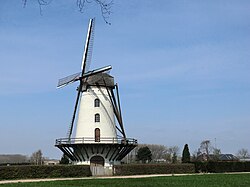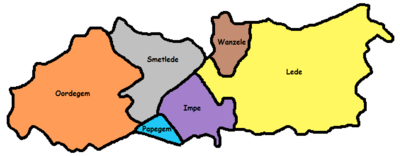Lede, Belgium
Lede | |
|---|---|
 | |
| Coordinates: 50°58′N 03°59′E / 50.967°N 3.983°E | |
| Country | |
| Community | Flemish Community |
| Region | Flemish Region |
| Province | East Flanders |
| Arrondissement | Aalst |
| Government | |
| • Mayor | Geertrui Van de Velde (CD&V) |
| • Governing party/ies | CD&V, Groen, de coöperatie |
| Area | |
| • Total | 29.89 km2 (11.54 sq mi) |
| Population (2018-01-01)[1] | |
| • Total | 18,628 |
| • Density | 620/km2 (1,600/sq mi) |
| Postal codes | 9340 |
| NIS code | 41034 |
| Area codes | 053, 09 |
| Website | www.lede.be |
Lede (Dutch pronunciation: [ˈleːdə] ) is a municipality in the Belgian province of East Flanders, in the Denderstreek near the cities of Ghent, Aalst and Dendermonde.
In 2011, Lede had a population of 17,882[2] and area of 29.69 km2, a population density of 575 inhabitants per km2. The current mayor of Lede is Geertrui Van de Velde (CD&V).
Name of Town[edit]
The meaning of the name 'Lede' comes from the Dutch word 'Ledenaars' which means 'The Proud Farmers'
Geography[edit]
The municipality comprises the sub-municipalities of Impe, Lede proper, Oordegem, Smetlede, Wanzele, and the hamlet of Papegem. All the sub-municipalities and also the hamlet are crossed by the Molenbeek.

Sandstone[edit]
The Lede Formation (Dutch: Formatie van Lede; abbreviation: Ld) is a geologic formation in the subsurface of Belgium. The formation is named after Lede. It consists of shallow-marine limestone and sandstone, deposited in the former sea that covered Belgium during the Eocene. The bluestone (for roads) and in particular the yellow-brown calcareous sandstone extracted from quarries in Lede and neighbouring areas, were widely used during the 15th to 18th century as construction material for religious and civil buildings.[3]
History[edit]
Lede has its origins going back to the Middle Ages, controlled by various Lordships, especially the 'de Bette' family, (Marquess of Lede). The local church, 'Sint-Martinuskerk', was built in 14th Century. A Castle was built here in the mid-1700s.
The Brussels-Ghent railway line was constructed through Lede in 1856. But industrial development remained limited: a few rural breweries, weaving mills, clothing and shoe companies were founded by local families, but all disappeared by the late 20th Century.
Sights[edit]
Lede is known for a statue of the Virgin Mary, inside the Martin's Church, called "Onze-Lieve-Vrouw-van-Zeven-Smarten" (Our Lady of the Seven Sorrows), to which a local legend attributes miraculous powers, such as healing of diseases. The statue attracts many pilgrims. The statue is taken around in a procession during a Sunday in June, after the biannual nine-day festival. The local church, built in 1496, houses the statue.

The former Mesen Castle was situated in central Lede. It used to be the residence of the Marquess of Lede until its family line died out in the early 19th century. It was used as a private girls' school until it closed in the 1970s. It began to fall into ruins by the 1990s. The local authorities began to demolish parts of the castle in 2010, dispite protests from the local population to preserve it. But most of the structure was completly torn down by 2015. The former castle gardens still exist as a park.

Economy[edit]
The economy of Lede consists of agricultre and small businesses, including tourism. A psychiatric clinic is also here. The communty is known for its fields, woods, horses and hiking/jogging trails. One such nature area is the 'Vallei van de Serskampse Beek.'
Notable people[edit]

- House of Bette (Marquess of Lede)
- Julius de Geyter[4]
References[edit]
- ^ "Wettelijke Bevolking per gemeente op 1 januari 2018". Statbel. Retrieved 9 March 2019.
- ^ "Lede Vandaag - Gemeente Lede". Archived from the original on 2011-09-29. Retrieved 2011-09-22. (in Dutch)
- ^ De Inventaris van het Bouwkundig Erfgoed, Lede Archived 2014-03-10 at the Wayback Machine (ID: 20771) (in Dutch)
- ^ The Twentieth Century Home Encyclopedia and Gazetteer: Who Is Who? Embraces Over Six Thousand Short Biographies, Volume 2






